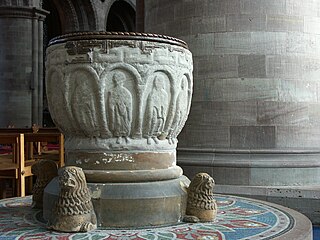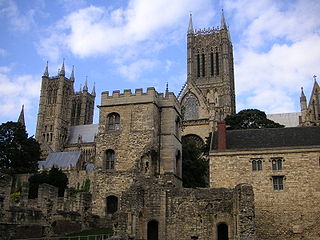Related Research Articles
Robert of Ghent or Robert de Gant was Lord Chancellor of England and Dean of York in the 12th century. The younger son of a nobleman, Robert was probably a member of the cathedral chapter of York before his selection as chancellor by King Stephen of England in the mid-1140s. He is not mentioned often in documents from his time as chancellor, but why this is so is unknown. He became dean at York Minster around 1147. Robert was slightly involved in the disputes over who would be Archbishop of York in the late 1140s and 1150s, but it is likely that his chancellorship prevented his deeper involvement in diocesan affairs. He was no longer chancellor after the death of Stephen, but probably continued to hold the office of dean until his death around 1157 or 1158.
Hugh de Puiset was a medieval Bishop of Durham and Chief Justiciar of England under King Richard I. He was the nephew of King Stephen of England and Henry of Blois, who both assisted Hugh's ecclesiastical career. He held the office of treasurer of York for a number of years, which led him into conflict with Henry Murdac, Archbishop of York. In 1153, Hugh was elected bishop of Durham despite the opposition of Murdac.
Henry of Newark was a medieval Archbishop of York.
Geoffrey de Burgh was a medieval Bishop of Ely.

Robert de Stratford was an English bishop and was one of Edward III's principal ministers.
William Langton was a medieval English priest and nephew of Archbishop Walter de Gray. William was selected but never consecrated as Archbishop of York and Bishop of Carlisle.
Robert de Chauncy was a medieval Bishop of Carlisle.
Simon of Wells was a medieval Bishop of Chichester.

Robert Foliot was a medieval Bishop of Hereford in England. He was a relative of a number of English ecclesiastics, including Gilbert Foliot, one of his predecessors at Hereford. After serving Alexander, Bishop of Lincoln as a clerk, he became a clerk of Henry of Blois, the Bishop of Winchester and brother of King Stephen of England. He attended the Council of Reims in 1148, where another relative, Robert de Chesney, was elected as Bishop of Hereford. Chesney then secured the office of Archdeacon of Oxford for Foliot.
Hugh Foliot was a medieval Bishop of Hereford. Related somehow to his predecessor at Hereford, he served as a priest and papal judge as well as being an unsuccessful candidate as Bishop of St David's in Wales. In 1219, he was appointed Bishop of Hereford. During his time in office, he mostly attended to ecclesiastical duties, but did occasionally serve as a royal administrator. He helped found a hospital and a priory, and died in 1234 after a months-long illness.

Hugh of Wells was a medieval Bishop of Lincoln. He began his career in the diocese of Bath, where he served two successive bishops, before joining royal service under King John of England. He served in the royal administration until 1209, when he was elected to the see, or bishopric, of Lincoln. When John was excommunicated by Pope Innocent III in November 1209, Hugh went into exile in France, where he remained until 1213.
William Cumin was a medieval Bishop of Durham elect, and Lord Chancellor of Scotland.
William Scot was a medieval Bishop of Durham-elect.
Richard Marsh, also called Richard de Marisco, served as Lord Chancellor of England and Bishop of Durham.
Dudley Persse (1625–1699) was an Anglo-Irish landlord and Anglican priest.
Reynold Gideon Bouyer was an English clergyman, archdeacon of Northumberland.
Richard de Sancta Agatha was an English medieval churchman and university chancellor.
Burchard du Puiset was a medieval Anglo-Norman clergyman and treasurer of the diocese of York. Either the nephew or son of Hugh du Puiset, the Bishop of Durham, Burchard held a number of offices in the dioceses of York and Durham before being appointed treasurer by King Richard I of England in 1189. His appointment was opposed by the newly appointed Archbishop Geoffrey, which led to a long dispute between Geoffrey and Burchard that was not resolved until the mid 1190s. After the death of Hugh du Puiset, Burchard was a candidate for the Hugh's old bishopric, but lost out in the end to another candidate. Burchard died in 1196.
Richard Middleton was an English ecclesiastic and Lord Chancellor of England.
References
- ↑ Greenway, Diana E. (1971). Archdeacons: Northumberland, Fasti Ecclesiae Anglicanae 1066–1300. Volume 2: Monastic cathedrals (northern and southern provinces). Institute of Historical Research. pp. 39–42.
- 1 2 Feingold, Mordechai, ed. (2006). History of Universities. Volume XXI/1, Volume 21. Oxford University Press. p. 18. ISBN 978-0199297382.